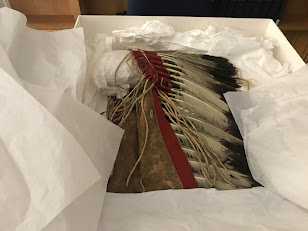Allegedly, the ocotillo fence surrounding Tombstone’s Boothill Cemetery is 150 years old; however, everything in this town that purports to be fact is suspect. Even though this cemetery was brought back from ruin in the 1920s (having been abandoned in about 1884,) it turns out that a few of the markers are actually characters from a novel that was popular at the time!! So, we know that at least some license was taken.
I took a picture of Mrs. Stump’s resting place, because it was one of only a few enclosed by a fence. Mrs. Stump died during childbirth after being given an overdose of chloroform by the doctor. For the small fee of $3 (because even corpses must earn their keep in Tombstone) you may enter the famous old cemetery. The same guy who claims the cactus fence is 150 years old will hand you a brochure describing the more than 250 graves, often including details about lives and deaths of the inhabitants.
The cemetery includes a Chinese section, because even Tombstone had a Chinatown (one block) during its heyday. I didn't know about the Jewish section, far down at the bottom of the hill and not featured in the guide pamphlet, until after we had left the town far behind. At Boothill Cemetery, you can check out any time you like, but you can’t never leave unless you first pass through the gift shop, because it’s the only exit.
Below in the town, the municipal parking lot for visitors is across from Schieffelin Hall, which was once the 'high class' opera house in town, the respectable alternative to places such as the Bird Cage, where ladies of the evening were displayed in 'cages,' balconies above the barroom floor where curtains could be drawn when a private customer climbed the back stairway to visit. It is here that a sneaky storm cloud of foreboding quietly settles. Crossing Fremont Street and heading down 3rd, you pass in front of what was once the Wells Fargo horse corral, but now hosts a Sarsaparilla stand; on the opposite side of the street, where you walk, is a dusty town park in what was once a blacksmith's yard. A hysterically-laughing man, alone, swings on a swing to the highest point possible.
Everything in Tombstone costs money. 10 bucks gets you a ticket to the super weird gunfight, a peek into the Tombstone Epitaph (newspaper) museum and its antique printing presses, and other displays such as the creepy “lifelike figures” in their proper positions standing in the dust of what was once the OK Corral. Several times a day, on an artificial set just yards away from where it really happened, performers reenact the gunfight at the OK Corral in front of a very vocal audience. We arrived about 30 minutes before the last fight of the day, when reenactors representing the Earp brothers and Doc Holliday took to Allen Street (still unpaved and lined with wooden sidewalks) where they strolled up and down, yelling last call to any tourists who still wanted tickets.
Also included in your $10 fee is the opportunity to visit the recreated prostitute’s crib. It’s a little more cozy and charming than I would imagine most of the 6th Street cribs really were back in the day, with rose pink walls, a flowered pitcher and wash bowl, and a rumpled patchwork quilt on the iron bedframe.
The crib also hosts a display related to chemical/medical use and misuse by these unfortunate women; laudanum, mixed with whiskey, was widely abused by prostitutes, who felt that it made their existence more tolerable. Laudanum’s popularity in the Victorian era was partly due to the fact that it offered a private alternative to publicly visiting opium dens. Carbolic acid was used to prevent venereal disease. These and other ‘medicines’ of the time often led to the deaths of those who used them.
Reflected in the mirror above the chamber pot is a portrait of Kate, the long-time girlfriend of Doc Holliday. Although she was well-educated, and (disputably) had a privileged upbringing as the daughter of the personal physician to Mexican emperor Maximilian I, she too had a history as a soiled dove. Upon the couple's arrival in Tombstone, Kate became proprietress of a successful saloon; their always-rocky relationship soon worsened and ended for good following the infamous gunfight, which forever changed (or ended) the lives of all involved.
Kate's saloon is still where it has always been. Outside on the boards, between the saloon and the site of the 1880s barbershop/bathhouse, is a convenient bench for people-watching. Modern cowboy fantasists walk past, spurs a-jingle. Across Allen Street, Tombstone's version of an itinerant busker is dressed as a Kachina, fully absorbed in a warbling, drumming, jangling dance of his own sacred composition.
There is supposed to be an Apache curse on the town, ensuring that no two white people can live in peace there. I only learned this after our visit, while researching possible reasons for all the strange negative energy I felt there.
Yes. There really is a crazy enormous rose tree in a courtyard behind the corner of Fourth and Toughnut Streets. Buildings/walls have been constructed around this end of the block to hide any view of the tree, but for a mere 10 dollars you can pass through these doors and enter into the presence of the rose tree. I know it's there because you can see it on Google Earth.
Schieffelin Hall, at the corner of Discord and Misery. "You'll find nothing there but your tombstone!"
"A mine is a hole in the ground owned by a liar." -Mark Twain








